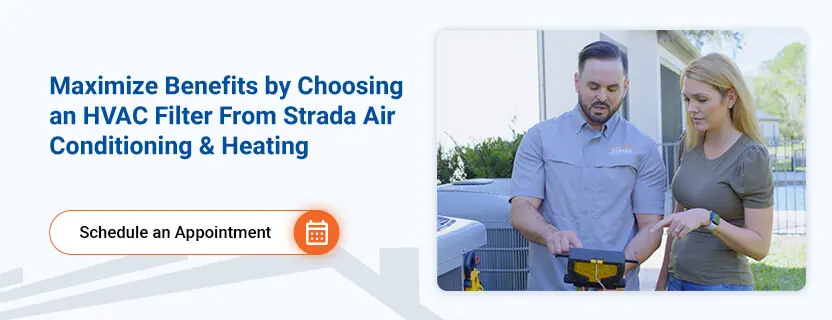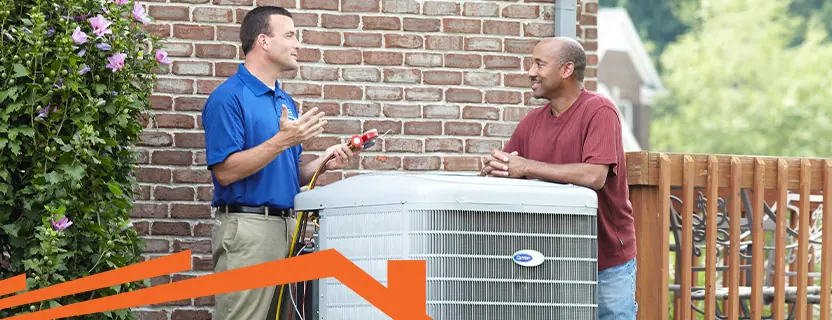
Your HVAC filter is crucial to ensuring system efficiency and delivering the at-home experience you want. These filters protect your home from pollutants and keep your system free of contaminants that could impact function. Choosing the right filter is crucial for maintaining your HVAC system and home.
However, every type of filter has unique benefits and drawbacks. Understanding the various types and their qualities can help you make an informed decision with long-lasting peace of mind. This HVAC filter guide will walk you through the common HVAC filter types available, the benefits of each and how to choose the right one for your system.
Different types of HVAC filters impact your home in different ways, but one thing they all have in common is their effect on air quality, contributing to a safer indoor environment. Contaminants like pesticides, molds, tobacco smoke, ozone, pet dander and volatile organic compounds can infiltrate indoor spaces and harm your health. Poor ventilation or improper air quality control can cause adverse reactions, including headaches, itchiness in the throat and eyes, respiratory complications, fatigue and more.
Air filters, especially those with high ratings, can trap contaminants, preventing them from infiltrating your home. Depending on the filter you have, your system could be more than 99% effective at removing particles as small as 0.3 microns.
However, improving your air quality also relies on your understanding of your system’s needs and taking preventive measures to ensure efficiency. You should only use HVAC components that are suitable for your system, and you must change or treat filters as necessary. If contaminants clog your filter, your system will be less capable of protecting your home, and particles will be more likely to slide through.
There are several common types of HVAC filters. Each has unique features and can improve your life and home in different ways. Choosing the right one is essential for maximizing benefits and delivering peace of mind.
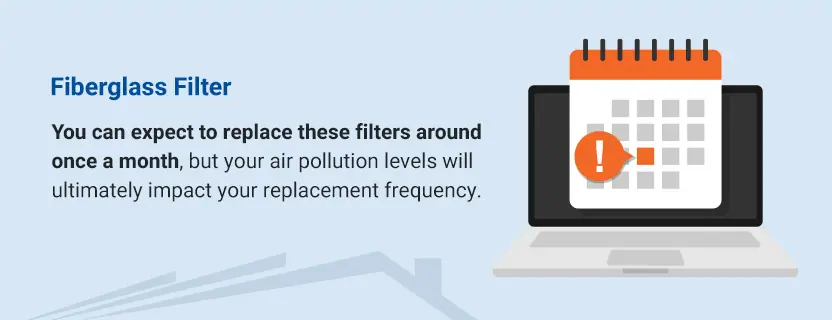
Fiberglass filters are often the most budget-friendly. Featuring stands of glass and a metal grate for reinforcement, fiberglass filters keep large contaminants from impacting your system and are suitable for catching carpet fibers, pollen and dust. They are less suitable for catching smaller pollutants, which may make them less ideal for those with allergies or respiratory sensitivities. Additionally, you must monitor them for clogs to ensure efficiency.
Generally, you can expect to replace these filters around once a month, but your air pollution levels will ultimately impact your replacement frequency. Fiberglass filters can be ideal for those with low airborne pollutant levels and looking for a cost-effective way to control air quality.
These filters feature pleats to capture small pollutants like pollen, pet dander and mold spores. The pleats increase the filter’s surface area, allowing the filter to catch more contaminants. They are often made of cotton or polyester, and the larger surface area makes them more effective than fiberglass varieties. Pleated filters have varying ratings that indicate a broader range of efficiency for capturing particles of varying sizes.
You can find disposable or reusable pleated filters. Although typically more expensive than fiberglass, pleated filters are generally more effective at improving air quality. However, the pleats can sometimes restrict airflow.
Electrostatic filters are a combination of paper fibers and cotton. This mixture creates static electricity that can perform as a magnet for trapping contaminants. When air passes through the electrostatic filter, the particles become charged and are drawn to the charged plates of the filter.
People with allergies and sensitive respiratory conditions can benefit from these filters because they trap common pollutants and prevent them from spreading around the home. Some electrostatic filters also utilize a carbon filter, making them even more efficient. You can find disposable and washable varieties, but either type often requires professional replacement or installation.
These flat or pleated filters allow you to reuse them by vacuuming or rinsing them free of pollutants. This reusability can make them more budget-friendly for some homeowners and better for the environment.
You must ensure the filter is dry before replacing it in your system to prevent bacteria or mold growth. Additionally, proper maintenance is crucial for system efficiency. Manufacturer manuals will depict how to care for washable filters, and you must adhere to these guidelines. As long as you can commit to the maintenance, they can be a great long-term investment for your home and wallet.
HEPA filters are incredibly efficient. They have a unique design that captures large and small particles — particles in close proximity to the filter will adhere to it. This makes them ideal for many homes. HEPA filters also have a dense mesh, making it challenging for larger particles to navigate through.
If your primary focus is to improve air quality and ease respiratory condition symptoms, these filters are superior. The United States Environmental Protection Agency (EPA) states that these filters can remove up to 99.97% of bacteria, mold, pollen, dust and other airborne particles.
Some HVAC systems utilize UV filters to kill microorganisms like bacteria and viruses with ultraviolet light. As air passes through the filter, it’s disinfected to eliminate harmful contaminants. However, these filters are not an effective way to remove contaminants like dust. You can sometimes combine UV filters with HEPA filters to create an advanced filtration system.
These filters can create ozone by transforming oxygen, which can be harmful to your health by causing throat irritation, lung tissue inflammation and chest pain. Look for ozone-free UV filters to reduce the likelihood of this process occurring. You may also want to consider implementing additional ventilation in case ozone does build up.
These filters use a pleated paper-like material design within a metal cabinet to filter air. They can be beneficial for those looking to achieve efficient filtration without impacting airflow. Media filters’ large surface area prevents static pressure from building significantly. They are also simple to care for, often needing replacements once or twice a year. However, these filters generally require professional installation, which may be inconvenient for some homeowners. They are also not effective at filtering odors.
The best air filters for HVAC systems are assigned a high filter rating. You can use these scales to determine filter efficiency for addressing your specific needs. While there are several filter rating systems, the ones you are most likely to encounter include:
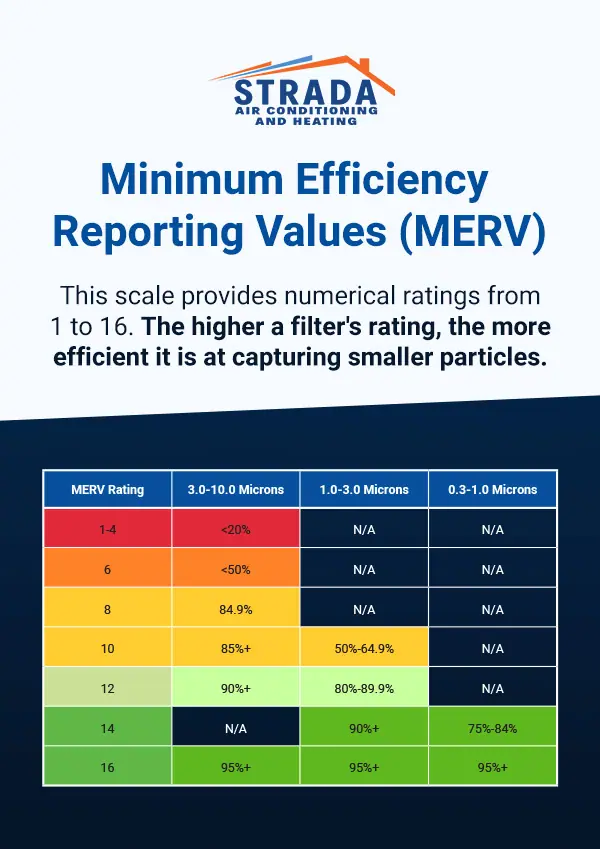
MERV ratings depict a filter’s ability to catch airborne particles. This scale provides numerical ratings from 1 to 16. The higher a filter’s rating, the more efficient it is at capturing smaller particles. For example, ratings 1 through 4 are suitable for capturing larger particles, while those with a rating of 13 or higher are ideal for capturing smaller pollutants that can impact system efficiency.
The United States Environmental Protection Agency provides the following information about filter efficiency:
Unlike MERV, HEPA filters do not rely on a numerical scale for defining efficiency. Instead, this scale uses grades. You can find Grade A, E, H and U HEPA filters. These grades depict specific HEPA filters, such as an Ultra-HEPA filter or Absolute HEPA filter. There are also additional scales within each type, such as H13 and H14 filters, with the higher number indicating higher efficiency.
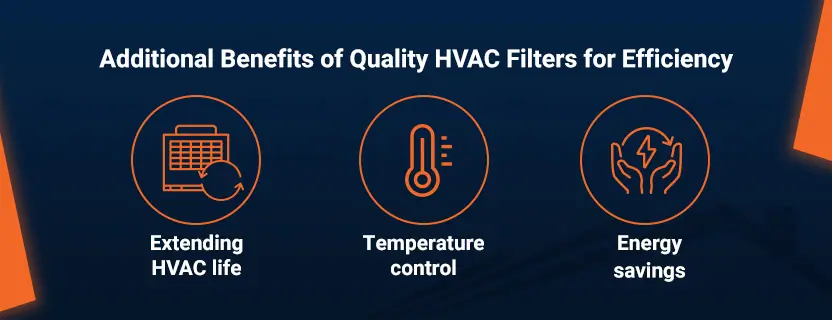
Beyond improving air quality, investing in a high-quality HVAC filter can deliver several other benefits:
Although each air filter has unique benefits, some will be more beneficial for your home than others. Here’s what you should keep in mind when browsing for a new filter:
Selecting the right HVAC filter impacts your air quality, health and HVAC system. When you need a filter replacement, trust Strada Air Conditioning & Heating to help you make the right choice. Our experienced technicians use a personalized approach to ensure safety and comfort. Schedule an appointment to discover how we can improve your home.
